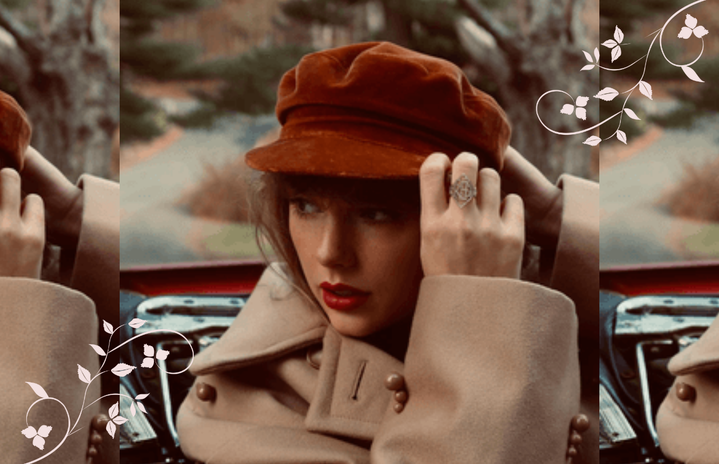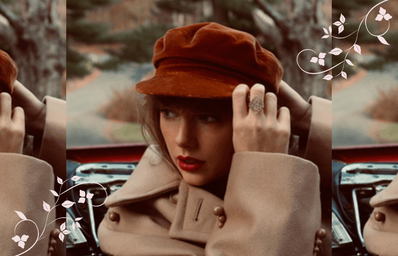If the plaid shirt days, wind in your hair, and leaves falling like pieces into place haven’t already gotten you into that reflective, autumnal, and nostalgic headspace this November, Red (Taylor’s Version) surely will. Millions of fans across the globe stayed up well into the night to absolutely devour the remaster of Swift’s award-winning 2012 album, Red, this time guilt-free, knowing that all streams, purchases, and rights go straight to Taylor herself (and never again to Sc**ter Br*un—ahem, I mean, he who shall not be named). What a sad, beautiful, and tragic night that was for many, myself included. 31 songs—some old, some new—were streamed so earnestly that Spotify nationally crashed. I’m convinced that we all went silent for a solid 10 minutes while listening to the new version of arguably the most heartbreaking song Taylor has ever written… you know the one. I could write forever about every song off Red, but alas, I’ll keep it short(ish) and analyze the track living rent-free in everyone’s minds right now: the 10-minute version of “All Too Well”.
Releasing a 10-minute long song is an extremely bold thing to do in the music industry. It’s basically saying “goodbye” to any hopes of the song being played on the radio or being streamed fully by non-fans and casual listeners. I can count the number of songs I know that are 10 minutes on one hand—it’s daring and doesn’t succumb to the naturally short attention span the average person has when it comes to consuming media. Taylor Swift was well aware of this. In a 2012 interview with ABC News, Taylor admits that “All Too Well,” the first song she wrote on the Red album, was originally about 10 minutes long, but she had to cut it down to about half of what it was because a 10-minute song is just something “you can’t put on an album.” This was a while ago though, and through the years, Taylor has taken complete ownership and power over her music and career, dropping albums like hotcakes, whenever and however she felt like it. The pleas of her fans were the reason behind the release of the 10-minute-version on the remastered version of Red, and listeners all over the world are ever-so-grateful.
Processing “All Too Well” is different for everybody, based on personal experience and the way you deal with your emotions. For some, it is looking back on a time you were hurt so deeply, somehow fondly—a once open wound has now healed and left a scar that prompts you to remember how it happened, but doesn’t hurt you anymore. For some, it’s a cut that has healed and opened time and time again, starting to bleed when you least expect it—it still hurts, even though eventually it’ll just be a scar. And for others, it’s a new wound. “Looking back” isn’t even in your repertoire, as you live in the hurt, unsure of when or if the bleeding will ever stop (it will, just in time). The “old” “All Too Well” fits into the first category the most, as lyrics revolve greatly around nostalgia and bittersweet memories of “singing in the car, getting lost upstate” and looking at her past lover’s childhood photographs of him with “glasses and a twin-sized bed.” It’s textbook reminiscence for happier times before a breakup. Her lyrics certainly diverge into anger and pain during her famous bridge (“you call me up again just to break me like a promise, so casually cruel in the name of being honest”), but other than that, we mostly get a raw expression of hurt by taking a trip down memory lane.
The lyrical additions to Taylor’s version of “All Too Well” add a whole new dimension to the song and a peek into her past that I never thought I’d be granted. Of course, we as listeners will never know the full story of Swift’s relationship with Jake Gyllenhaal (who, let’s face it, the song has to be about). And, we shouldn’t, because that’s between them. However, we get more insight and examples of why this breakup was so painful for Swift. I believe that this version hit its original audience significantly harder, not only because we are older and have experienced more, but because we have much more lyrical content to relate to. This version paints the picture clear with imagery of a young girl, right at the precipice of adulthood and still finding herself and who she wants to be, who was ultimately manipulated and fooled by a man almost 10 years older than her, who did not care about her as much as he made it seem.
Some may think that Gyllenhaal didn’t do anything wrong and that it was a breakup like any other, while others are currently viewing him as the public enemy. Wherever you stand, it’s plain as day that his actions towards her hurt, and that is frankly all that matters. Taylor expresses falling in love with someone who withholds affection so adamantly until they were already broken up (“it’s love, you never called it what it was, ’til we were dead and gone and buried”). Doing this is a form of neglect that is extremely manipulative; it’s a way of holding power and dominance in the relationship, which makes sense due to their age gap. Not being taken seriously or like a priority was also a heavy topic in this song’s added lyrics, as she spent her days devoted to her lover, treating their love like “an oath” while he simply stamped it “a secret.” This is especially heartbreaking, as lyrics point strongly to him manipulating her into letting him take her virginity and then completely dismissing her value as a person. I usually don’t like to say that someone’s virginity was “taken” or “lost,” as it imposes the idea that it was stolen from a woman, not given autonomously—but because of their age gap, I feel as though it’s appropriate to describe it as taking and coaxing.
She describes his fixation on innocence (“it (her scarf) reminds you of innocence, and it smells like me”), and says she feels like a “crumpled up piece of paper lying here” after the relationship is done. A crumpled piece of paper may just be her describing feeling used emotionally, but could also very well be describing feeling used sexually, as the paper/tape analogy is a very common way to describe losing your virginity in highly-religious households (you start as an unused piece of paper or tape, and if you have sex before marriage, that paper becomes crumpled and damaged and will never able to return to its original state. This is kind of a messed up analogy, I know, but it’s still prominently used to inspire abstinence). She felt like a silly kid waiting for him to walk through the door on her 21st birthday, a day that was “supposed to be fun,” but now just reminds her of his dismissiveness. This gives all the more meaning to her party-pop song “22” and the importance she placed on having a fun 22nd birthday celebration, where she and her friends “forget about the heartbreaks.” If you ever wondered why someone would write a song about the age 22, which is seemingly meaningless compared to 21… now we know! She describes his empty gestures of portraying himself as a feminist, the “‘f*ck the patriarchy’ keychain on the ground” as he tossed her the car keys while doing his big-celebrity-man work calls (depicted in the short film). All in all, these lyrics all express the small, but very painful, things she remembers from their relationship. She will always remember them, despite his constant attempt of gaslighting her into thinking they never happened this way.
This is not a pity song whatsoever. While lyrics are melancholy, they are juxtaposed with expressions of pure strength and growth, which is a side of Taylor I will never get tired of seeing. She questions, “the idea you had of me, who was she?” as she wonders how he could perceive her as a “perfect,” but weak girl who would simply reflect exactly what he wanted her to be and what was convenient for him. Who was she? Taylor doesn’t recognize her — if that was once the persona she made herself seem, that persona is long gone, and the powerful, independent, and outspoken woman who lives for herself has come out and is here to stay. She continues, adding that she was “never good at telling jokes, but the punchline goes [she’ll] get older but [his] lovers stay [her] age.” For lack of better words, this is an absolutely savage line and made me gasp when I listened to it for the first time. She’s implying that she will grow up and learn from this relationship, eventually finding someone who will treat her with dignity, but he will still be chasing after young girls who are easy to gaslight as the cowardly person he is. Ha! Incredible. She compares their toxic relationship as going to war, a time where she lost quite a bit of herself, followed by how the relationship ending made her return “half [her] weight.” Maybe this is a metaphor for slowly rebuilding herself, or maybe she did lose quite a lot of weight while they were dating, which is a common part of being in a toxic relationship. Either way, she shows that she is better without him—healthier. She is healing from the love affair that “maimed” her and “paint[ed] [her] blue.” She’s coming back, burning red.
The most powerful message that I get over and over again from Taylor Swift is that it’s okay to feel things. We are constantly told to heal and get over our hurt on time, or else we are bitter and petty and vengeful. Taylor is point-blank evidence that one can embrace their “ugly”—their wounds, pain, rage, and regret—and still grow at the same time. We can still evolve into butterflies without forgetting what we had to go through to get to that stage, and how we started as tiny little caterpillars. People have belittled Taylor Swift for years about her “preoccupation” with ex-lovers, willing her to just “get over it,” because heartbreak is a part of life. There are still articles being written with titles like “Every Ex-Boyfriend Taylor Swift Has Written A Song About, Proving She’s A Psycho.” This happens to so many female artists (*cough cough* Olivia Rodrigo) who are pegged as silly little girls who carry on dramatically about their pain for far too long. What an ugly thing it is to say that someone isn’t allowed to express their feelings of hurt, and what a thing that is rooted in blatant misogyny. Taylor actively revolutionizes a group of women who will feel how they feel wholeheartedly with no shame, and this song is a perfect example of that. So, it is okay to still not be over a high school heartbreak, to still think about a past betrayal, to not be able to move on just yet. It’s not embarrassing. It’s not petty. It’s honest. Maybe remembering things “all too well” doesn’t have to be pitiful—maybe it is a sign of strength.


